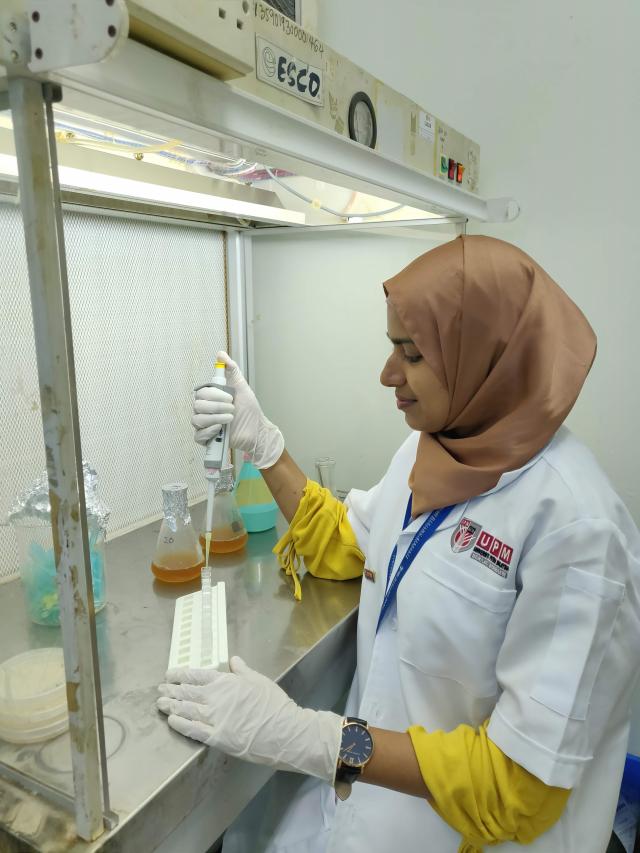
Sayma Serine Chompa
Agricultural Sciences
A PhD fellow from Bangladesh hopes bacteria might be the answer to mitigate salt stress in rice crops
I intend to disperse my achieved knowledge as one of the leading researchers in my country in the domain of microbial biotechnology, to support sustainable and prosperous agriculture.

Sayma Serine Chompa is a 2019 OWSD PhD fellow from Bangladesh, currently completing a full-time fellowship at Universiti Putra Malaysia (UPM), where she is researching the potential for a group of bacteria to help rice plants cope with increasing soil salinity.
How did you learn about the OWSD fellowship? How would you say it has impacted your career?
It is my pleasure to be a full-time OWSD fellowship awardee. I learned about the fellowship through one of my relatives who was also an awardee of the OWSD fellowship; after learning about it in 2019, I applied for the first time, and fortunately my application was selected on my first attempt.
This fellowship is truly significant and has impacted my career a lot. It will lead to continuing my research and to having broader exposure in my preferred field. I was a fresh graduate, had just finished my Master’s degree and worked in an NGO as a health assistant when I was awarded the fellowship; however, undertaking the PhD degree is allowing me to explore new realities and facts in my research area.
What are you researching? What first made you interested in this subject, or how did you decide to focus on this?
My research interest is in soil microbiology. The title of my PhD thesis project is 'Field Evaluation and Proteomic Analysis of Salt-Tolerant Plant Growth-Promoting Rhizobacteria (PGPR) as a Consortium and Their Effects on Rice Growth and Yield at Salt-Affected Areas.' Plant growth-promoting rhizobacteria refer to a group of bacteria that fix atmospheric nitrogen from the soil and help to enhance the physiological properties of plants; in addition to this, the bacteria ameliorate the salt stress on plants for better growth and yield.
I became interested in this topic because globally, plant growth and productivity are being hampered by salinity. This is considered one of the most important problems in agriculture. Rice (Oryza sativa L.) is one of the staple food crops across the globe, and the demand is rising to feed the ever-increasing human population. Rice is a glycophyte plant by nature; it is inherently prone to salinity and will show a wide and profoundly detrimental response to increased salt levels in the soil. Seawater intrusion is occurring all over the world, which damages the plant and significantly reduces the yield. To combat the effect of salinity, an affordable and sustainable approach using multi-strained salt-tolerant PGPR beneficial rhizobacteria has been proposed. The bacteria can play a crucial role in ameliorating the salt stress at a tolerable rate. The bacterial mechanisms that help the plants cope with salinity stress need to be documented by proteome research.
Has anything surprised you about your research experience?
From my research so far, I have found that many salt-tolerant bacteria are associated with plant roots; these are called rhizobacteria. They can survive in the outer zone of the roots (root surface) as well as colonize and live inside the roots (endophytic bacteria). These bacteria are very effective to combat the soil salinity at a very high rate and increase plant growth and yield. I have come to understand that proteomic analysis (molecular characterization) contributes significantly to the understanding of gene function in the post-genomic era. Research on the protein chemistry helps to elucidate the protein expression responsible for the rice plant-microbe interaction under salt-stress conditions.
What are your plans for the future (after you receive your PhD)?
My plan for the future is to become an experienced, excellent, and quality scientific researcher. I like to learn new things. I intend to disperse my achieved knowledge as one of the leading researchers in my country in the domain of microbial biotechnology, to support sustainable and prosperous agriculture. My plan is also to inspire, encourage, and assist women in their academic and research careers in this field.
How has the COVID-19 pandemic impacted your research?
Though I have completed all my course work through online classes, I am still having some difficulties entering the faculty area due to the Full Movement Control Order (FMCO) implemented in Malaysia because of COVID-19. The COVID-19 pandemic has negatively impacted my research work. However, with great difficulty, I have been able to work towards my first milestone, and am trying to finish within the assigned time frame.










































